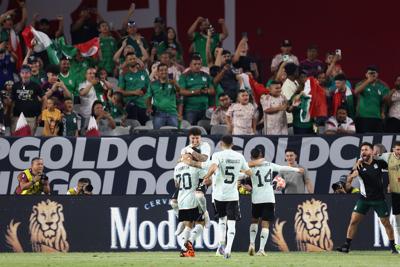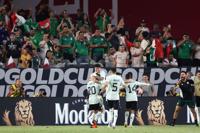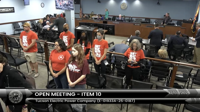
Henry Martín #20 of Mexico celebrates with teammates after scoring a goal against the Haiti during the second half of the Concacaf Gold Cup Group B match at State Farm Stadium on June 29, 2023 in Glendale, Arizona.
Mexico defeated the Dominican Republic on Saturday, with a final score of 3-2. The following day, the United States celebrated an easy win against Trinidad and Tobago with a score of 5-0.
These were the first two matches played in the 18th edition of the CONCACAF Gold Cup, and if things go as they have in previous soccer tournaments, either one of these men’s national football teams could once again win the title.
Mexico holds the record for the most tournament wins, with nine, while the United States follows with seven. Only Canada has been able to outperform the two with a title win in 2000 against Colombia.
With Saturday’s match marking the start of the roughly three-week-long tournament, teams have a ways to go before reaching the knockout phase, but venues and host cities are ready to start receiving soccer fans, especially in areas like Glendale, Arizona, where the border tends to lend itself for incoming Mexican tourists before extreme heat settles in for the summer.
“As the last official centralized tournament in our region before the FIFA World Cup 2026, this Gold Cup will provide all participating federations with a great challenge and will be critical to their preparations for World Cup qualification and for participation in the FIFA World Cup itself,” said Victor Montagliani, CONCACAF president and FIFA vice president, in a release announcing the venues for the tournament.
With a soccer event that centers North and Central American and Caribbean countries, it’s no wonder that certain venues across the U.S. are chosen.
In the venue lineup announcement, Montagliani thanked hosting cities for “their commitment to supporting the growth of the game in our region.”
This year, a total of 14 stadiums across 11 metropolitan areas will host the event, including Los Angeles, several cities in Texas, Las Vegas and Glendale, Arizona, a city within the central Phoenix metropolitan area.
The Los Angeles region has always hosted the tournament, with the inaugural eight-team championship in 1991 debuting in the famous Los Angeles Memorial Coliseum and Pasadena Rose Bowl.
Phoenix, however, got its start in 2009, nearly three years after the then-named University of Phoenix Stadium was built as the home of the Arizona Cardinals.
This year marks the seventh time the stadium welcomes soccer fans and the fourth hosting knockout-phase matches — including quarterfinals and one semifinal in 2019 — which have historically seen the men’s Mexican national team measure up against other Latin American federations.
On June 28, the Phoenix area will once again see an influx of locals and tourists, both domestic and international, as they head out to both quarterfinal matches. With the group stage still underway, game details have yet to be determined.
Arizona is home to over 2.3 million Latinos, accounting for over 32% of the total population, according to recent U.S. Census data. Central cities like Phoenix, Glendale and Avondale are home to a majority Latinos, making up over 40% of inhabitants.
The majority of the state’s Latino population is of Mexican origin or descent, with over 2 million people identifying as such.
While soccer matches hosted at State Farm Stadium tend to occur only once or twice a year, the venue stands out in its ability to seamlessly switch from one sport to another.
“With a proven track record of safely managing and successfully hosting major events, State Farm Stadium continues to be selected for international soccer matches in the United States,” Melissa Wasson, general manager at State Farm Stadium, told CALÓ News.
Wasson said CONCACAF soccer matches tend to attract various international fan bases, supporting the stadium’s mission to generate tourism for the State of Arizona, while home games for the Cardinals tend to bring in more locals and season ticket holders.
She did not offer specific figures but said State Farm Stadium “consistently hosts sell-out crowds.”
With recent immigration enforcement activity picking up across the country, including in Phoenix and its surrounding cities, turnout may be impacted, however.
At SoFi Stadium, where the initial match was played on Saturday, officials said they saw a low turnout compared to previous years. The recently built stadium hosted its first Gold Cup game in 2023; however, this year, amid protests and an uptick in immigration enforcement raids in Los Angeles, saw just 54,000 attendees, according to the LA Times — the stadium has a capacity of 70,000.
Wasson said that stadium personnel were "focused on providing a safe and secure environment for all involved."
Tickets for all Gold Cup matches are on sale at https://www.concacaf.com/gold-cup/tickets/.











(0) comments
Welcome to the discussion.
Log In
Keep it Clean. Please avoid obscene, vulgar, lewd, racist or sexually-oriented language.
PLEASE TURN OFF YOUR CAPS LOCK.
Don't Threaten. Threats of harming another person will not be tolerated.
Be Truthful. Don't knowingly lie about anyone or anything.
Be Nice. No racism, sexism or any sort of -ism that is degrading to another person.
Be Proactive. Use the 'Report' link on each comment to let us know of abusive posts.
Share with Us. We'd love to hear eyewitness accounts, the history behind an article.